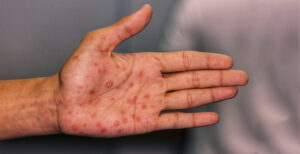
- Syphilis is a sexually transmitted infection that is caused by the bacteria and spread through sexual contact with the infected person. The initial symptoms of this disease are painless sore, that occurs in your mouth, genitalia or rectum. This infection spreads from one person to other via skin or mucous membrane through close contact with any of these sores.
- The bacteria can stay inert for a very long time even for decades after initial infection before it becomes active. Early stages of syphilis can successfully be treated with a single shot of penicillin and if syphilis goes untreated for a long time it can critically damage your vital organs like heart, brain or any other organs, and can prove to be fatal.
- The development of Syphilis occurs in stages and hence it is important to know what are the different symptoms at different stages.
- Primary Syphilis: The initial symptoms of syphilis that you are going to notice is a small sore, known as a chancre (SHANG- kur). The sore first appears at the point which is the entrance point of bacteria to enter your body. While most people infected with this condition develop only one chancre, some people may develop several of these. These usually go unnoticed as they are usually free of pain and heal within six weeks.
- Secondary Syphilis: when the original chancre heals, you may experience a rash, within a few weeks of it that begins to show up on your trunk but ultimately appears all over your body —including even your palms and the soles of your feet. This rash usually does not itch and are not characterised by wart-like sores in the mouth or genital area. Some people may also feel other symptoms like, sore throat, muscle aches, fever and swollen lymph nodes. These signs and symptoms generally tend to go within a few weeks or frequently come and go for as long as a year.
- Latent Syphilis: If you do not seek treatment for syphilis, the disease shifts from the secondary to the latent (hidden) stage where you do not experience any symptoms. The latent stage can last up to several years. Signs and symptoms may never come back, or the disease may progress to the third stage, also known as a tertiary stage.
- Tertiary (Late) Syphilis:Almost 15 to 30 per cent of people who are infected with syphilis and do not seek treatment on time will develop complexities known as tertiary (late) syphilis. In the late stages of this disease, there may be damage to your vital organs like the brain, nerves, eyes, heart, blood vessels, joints, liver, and bones. These problems occur several years after the initial, untreated infection.
- Congenital Syphilis: Infants born to women having syphilis can become infected through the placenta or during birth. Most newborns having congenital syphilis exhibit no symptoms, although there may be the occurrence of rashes on the palms of their hands
